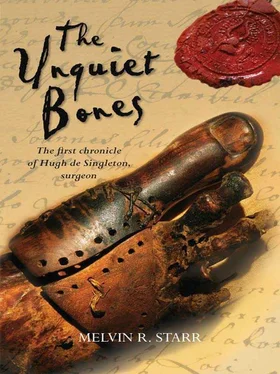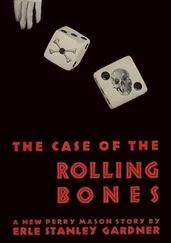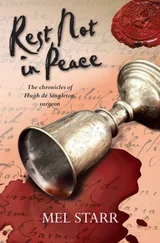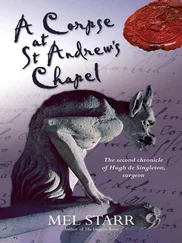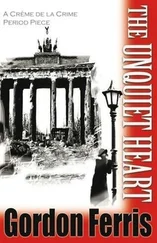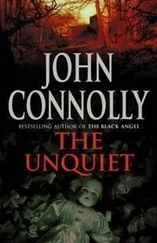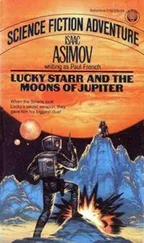Mel Starr - The Unquiet Bones
Здесь есть возможность читать онлайн «Mel Starr - The Unquiet Bones» весь текст электронной книги совершенно бесплатно (целиком полную версию без сокращений). В некоторых случаях можно слушать аудио, скачать через торрент в формате fb2 и присутствует краткое содержание. Год выпуска: 2008, Издательство: Kregel Publications, Жанр: Исторический детектив, на английском языке. Описание произведения, (предисловие) а так же отзывы посетителей доступны на портале библиотеки ЛибКат.
- Название:The Unquiet Bones
- Автор:
- Издательство:Kregel Publications
- Жанр:
- Год:2008
- ISBN:нет данных
- Рейтинг книги:4 / 5. Голосов: 1
-
Избранное:Добавить в избранное
- Отзывы:
-
Ваша оценка:
- 80
- 1
- 2
- 3
- 4
- 5
The Unquiet Bones: краткое содержание, описание и аннотация
Предлагаем к чтению аннотацию, описание, краткое содержание или предисловие (зависит от того, что написал сам автор книги «The Unquiet Bones»). Если вы не нашли необходимую информацию о книге — напишите в комментариях, мы постараемся отыскать её.
The Unquiet Bones — читать онлайн бесплатно полную книгу (весь текст) целиком
Ниже представлен текст книги, разбитый по страницам. Система сохранения места последней прочитанной страницы, позволяет с удобством читать онлайн бесплатно книгу «The Unquiet Bones», без необходимости каждый раз заново искать на чём Вы остановились. Поставьте закладку, и сможете в любой момент перейти на страницу, на которой закончили чтение.
Интервал:
Закладка:
“You didn’t follow?”
“Nay. I knew Margaret well enough to know I’d best be on my way. She’d cool in a few days an’ see more clearly. So I did think.”
“But she disappeared before you saw her again?”
“Aye. Near two months.”
“She was last seen the same day you took a cart of oats to Lord Gilbert Talbot, in Bampton.”
“Aye. Returned next day. Found her father at t’door.”
“’At’s right,” the father joined in. He had been standing silent beside the oxen during my conversation with his son. “Alard thought as how she’d run off w’Tom, ’specially as Tom wasn’t about. I tried to tell ’im where Tom’d gone.”
“You heard nothing of her after?”
“Not ’til Alard came through t’village on his way to Bampton t’bring her home. He told us you’d found her murdered.”
“Yes. Her state allows no other conclusion.”
“What state was that, then?” Tom asked through pursed lips.
I told him only that her body had been found and gave evidence of murder. The youth looked down at his feet again — and large specimens they were, too.
“Had Margaret spoken to you of any enemies? Did she fear anyone?”
“Nay. She had disagreements from time to time. No enemies. None in Bampton, anyway.”
“You had an argument with her and later you went to Bampton.”
Tom’s jaw dropped. I could see that the thought that he might be suspected in Margaret’s death had never occurred to him. Either that, or he was shocked and frightened that his guilt had been found out. He protested innocence, and his father vouched for his truthfulness. The youth spoke of his reasons for desiring Margaret for a wife, among which were her health, her likely fecundity, her reputation for hard work won at her father’s forge, and even her appearance. He did not mention love, but such emotion is trivial compared to the important issues of survival, work, and heirs.
I left the two men staring at my back as I climbed the hill back to town and Bruce. Thomas Shilton seemed to me the most likely suspect in this unhappy death, yet he seemed incapable of such a deed, and the fondness he felt for Margaret was revealed in his voice, his manner, and the empty expression in his eyes.
I do not know how to read a face or posture. The things hidden behind a man’s eyes remain a mystery to me. I have been trained to deal with visible wounds, not the invisible.
The wind had risen during the day, and now propelled thick gray clouds from the northern horizon. I wrapped my cloak about me as the wind blew Bruce and me toward home. Bare trees swayed in the gale, dancers rooted to one place, in graceful motion nonetheless.
I passed the woods where, earlier in the day, I had found the cotehardie. I wished to be home, out of the blast, and safe from the sleet or snow I thought likely before morning. But my curiosity was too strong. I had yet an hour before darkness. I tied Bruce to a sapling while he gazed at me with a wounded expression. He wished to be home and out of the storm as much as I. Cotehardie in hand, I penetrated the underbrush. It took a few minutes of casting about before I found the place where the cotehardie had lain.
The wind was quiet here, its gusts broken by the forest. As I studied the ground, and kicked through the leaves searching for more clothing, I heard from the distance a dull thud. Then, a few seconds later, another.
It was difficult to tell, with the wind and dense vegetation, from which direction the sounds came. And when I determined the source, it was not an easy matter to work my way through the undergrowth and coppiced saplings toward the sound.
I came to a place where the coppiced trees thinned to an older growth of forest just as a final thud brought the sound of a falling tree crashing through the branches of its still-standing neighbors. I had heard the sound of an axe laid against a tree — woodcutters were at their trade.
I followed the sound of axes lopping limbs from the fallen tree and found three men at work in the gloom of a gathering twilight. One of the three was conspicuous for the white cap he wore, which marked him from his companions in the dim light. It was the man whose skull I had repaired, who I had told to remain in bed for a week, and to do no toil for a month. Here, but seven days later, he was at his labors.
One of the three took that moment to rest on his axe — no doubt they had been employed at their task all day — and saw me approach. He spoke to his fellows and they ceased their labor to observe me as I picked my way through limbs cast off from trees felled earlier. My patient seemed to recognize me first — not that he could have remembered the time he spent in my surgery — and he spoke as I neared the group.
“You’ve come for your t’uppence, then?” he asked.
“No. You’ve a week before I want to see the wound and change the wrapping. You were to remain in bed until tomorrow. This,” I looked past them to the fallen oak, “could kill you. Your condition is brittle, and will remain so for many weeks.”
“Aye…so you told ’em,” he nodded toward his companions. “But,” he continued, “if I do not my share of the work I’ll not have fare to last t’winter. Then me an’ my household may starve. I take a risk, whether I work, or no.”
I saw his point. Left to his choice, I think I would have done the same. “Do you suffer…from the wound?” I asked him.
“Aye,” he shrugged. “Now an’ again.”
“When?”
“If I turn me head, quick like, or bend to me feet, then rise…mostly times like that.”
“That’s to be expected. You feel no other constant affliction?”
“Aye…me left hand an’ leg is weak, like.”
“Let me have a look.” I approached and peered at the bandage I had wrapped about his head. The wound seemed to be healing well, with little oozing to discolor the fabric. “I must change the wrap in a week.”
“I’ll bring yer pay,” he muttered.
I considered the man’s station, and my own diminished supply of firewood, and struck a bargain. In a week’s time he would bring twopence worth of firewood to me, in payment of the portion of my fee still due. In concluding this agreement I nearly forgot my mission, but another of the woodmen cast his eyes toward the cotehardie I held in my left hand and returned me to my senses.
I held the garment out before me and asked if they’d seen anyone wearing it. They hadn’t. I thought an explanation in order, so told them of the discovery. I left them with the admonition to seek me if they found more clothing. I did not think it a promising possibility that they would do so. I thought it more reasonable that they would wear what they found, or sell it, be it beyond their station, like the cotehardie. As I took leave of them I caught, in the shadows, an exchange of glances which suggested they knew more about the blue cotehardie than they wished to divulge.
It was dark before I found Bruce, and sleet pelted my back before I left the animal at the castle and made my way back across Shill Brook to Galen House. I don’t remember my supper that night. Whatever it was, it was cold. I ate, and crawled into a cold bed, hoping the woodmen would not long delay delivering the promised firewood.
Chapter 7
Sleet turned to an early snow, heavy and wet, during the night. The gale from the north continued to rattle my shutters even after the thin light of dawn penetrated the cracks between them. I had carefully banked my fire the previous morning, but there was not a coal left to reignite the blaze, and little wood for fuel when I managed to start it anew. I hoped the woodman would soon resolve his debt.
I had in my larder the remains of a maslin loaf I had purchased from the baker two days before, the heel of a cheese, and a small keg of cider. Of such was my noon meal. This simple fare seemed a banquet, for this day was Sunday and I ate no breakfast, as was my custom. Other than attendance at mass, I spent the day reading my copy of the Gospel of St John, beside my meager fire. There was no archery practice to observe because of the miserable weather, and no other reason to venture out. The town was silent.
Читать дальшеИнтервал:
Закладка:
Похожие книги на «The Unquiet Bones»
Представляем Вашему вниманию похожие книги на «The Unquiet Bones» списком для выбора. Мы отобрали схожую по названию и смыслу литературу в надежде предоставить читателям больше вариантов отыскать новые, интересные, ещё непрочитанные произведения.
Обсуждение, отзывы о книге «The Unquiet Bones» и просто собственные мнения читателей. Оставьте ваши комментарии, напишите, что Вы думаете о произведении, его смысле или главных героях. Укажите что конкретно понравилось, а что нет, и почему Вы так считаете.
